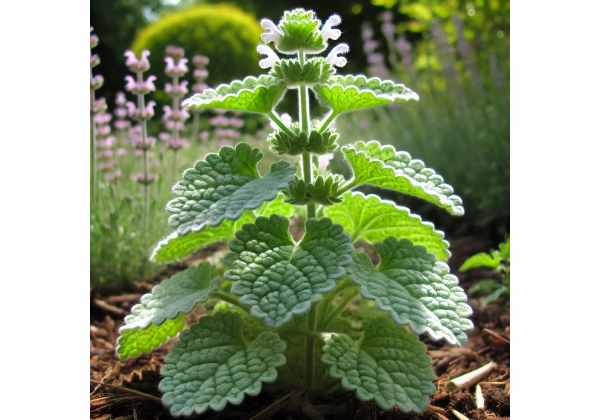
Lemon Catnip is a unique herb that marries the familiar, playful allure of catnip with a refreshing, citrus-infused aroma reminiscent of lemon. This intriguing botanical not only appeals to feline instincts but also offers a variety of benefits for human health. Rich in bioactive compounds such as nepetalactone derivatives, flavonoids, and essential oils, Lemon Catnip is known for its calming, antioxidant, and anti-inflammatory properties. Traditionally used to ease anxiety, improve digestion, and support skin health, it has found a place in both herbal remedies and modern aromatherapy. This comprehensive article examines its botanical profile, phytochemical composition, health benefits, practical uses, and scientific research, providing a detailed guide to harnessing the full potential of Lemon Catnip.
Table of Contents
- Botanical Insights and Morphological Features
- Phytochemical Analysis and Key Bioactives
- Holistic Benefits and Fundamental Qualities
- Practical Applications and Precautionary Guidelines
- Research Insights and Significant Studies
- Frequently Asked Questions
Botanical Insights and Morphological Features
Lemon Catnip is a perennial herb that belongs to the Lamiaceae family, which is well known for its aromatic and medicinal plants. Although it shares many similarities with traditional catnip (Nepeta cataria), Lemon Catnip has been selectively bred to enhance a unique lemon-like fragrance, making it distinct both visually and olfactorily. The plant typically grows to a medium height of 12 to 18 inches, forming dense clumps with a sprawling habit. Its leaves are heart-shaped, soft, and coated with a fine down that gives them a velvety texture, while their bright green color is often interspersed with subtle hints of yellow or lime. When gently crushed, the leaves release a refreshing, citrusy aroma that is both invigorating and soothing.
Taxonomy and Geographic Origin
Taxonomically, Lemon Catnip is classified within the Nepeta genus, sharing close genetic ties with other catnip species. Originally native to temperate regions of Europe and Asia, catnip has a long history of cultivation for its therapeutic and recreational properties. Lemon Catnip, however, represents a modern cultivar that has been enhanced for its distinct lemon scent. This enhancement has broadened its appeal not only to pet enthusiasts but also to herbalists and aromatherapists. Today, Lemon Catnip is widely grown in home gardens and commercial herb farms across temperate climates, particularly in regions that provide ample sunlight and well-drained soil.
Morphological Characteristics
The physical attributes of Lemon Catnip are both charming and functional. The leaves are its most striking feature—broad, ovate, and soft to the touch, with a lightly serrated margin. Their unique coloration and texture create an attractive display in any garden setting. The stems are sturdy yet flexible, supporting clusters of small, tubular flowers that typically appear in late summer. These blossoms, usually in shades of pale purple or white, add a delicate contrast to the vivid foliage. The overall growth habit is bushy and somewhat spreading, making Lemon Catnip ideal for ground cover and companion planting.
Ideal Growth Conditions
Lemon Catnip thrives in full sunlight but can tolerate partial shade. It prefers well-drained, moderately fertile soils and exhibits a strong resistance to drought once established. Regular watering during dry spells promotes lush growth, but overwatering should be avoided to prevent root rot. Gardeners value Lemon Catnip for its low maintenance requirements and its ability to naturally repel certain pests, which makes it a practical choice for organic gardening. Its vigorous growth also helps suppress weeds, contributing to a healthier garden ecosystem.
Ecological and Cultural Significance
Beyond its ornamental and aromatic appeal, Lemon Catnip plays an important role in supporting local ecosystems. The flowers attract a variety of pollinators, including bees and butterflies, which are vital for maintaining plant biodiversity. Additionally, Lemon Catnip is known for its gentle sedative properties, a trait that has been celebrated in folklore and traditional medicine for centuries. Culturally, catnip has long been associated with relaxation and playful energy in pets, while the lemon-enhanced variant has garnered interest for its potential human health benefits. Its dual-purpose nature bridges the gap between pet care and herbal medicine, making Lemon Catnip a fascinating subject for both gardeners and researchers alike.
Phytochemical Analysis and Key Bioactives
The therapeutic power of Lemon Catnip is largely attributed to its complex blend of bioactive compounds. These compounds work in synergy to produce a range of effects, from calming the mind to supporting immune function. Below is an in-depth exploration of the key phytochemicals found in Lemon Catnip:
- Nepetalactone Derivatives
As with traditional catnip, Lemon Catnip contains nepetalactone derivatives—the primary compounds responsible for its effects on cats. In human applications, these compounds exhibit mild sedative and anxiolytic properties. They are believed to interact with specific neural receptors, contributing to a calming effect that helps alleviate stress and promote relaxation. - Citral
Citral is a monoterpene aldehyde that imparts a strong lemon-like aroma to the herb. This compound is noted for its antimicrobial and anti-inflammatory properties. Citral plays a crucial role in neutralizing pathogens and reducing inflammation, making Lemon Catnip effective in supporting both respiratory and digestive health. - Limonene
Limonene is a naturally occurring monoterpene that provides a refreshing citrus note. Its antioxidant properties help combat free radicals, reducing oxidative stress and potentially lowering the risk of chronic diseases. Limonene also supports detoxification processes in the liver, contributing to overall metabolic health. - Linalool
Linalool is another important terpene found in Lemon Catnip, contributing to its soothing aroma and mild sedative effects. It has been shown to have calming properties, which can reduce anxiety and promote better sleep. Linalool also exhibits antimicrobial activity, supporting the herb’s use in both topical and internal applications. - Flavonoids (e.g., Luteolin, Apigenin)
Flavonoids are powerful antioxidants present in significant quantities in Lemon Catnip. Luteolin and apigenin help reduce inflammation, stabilize cell membranes, and protect against oxidative damage. These compounds are also linked to improved cognitive function and may provide neuroprotective benefits. - Rosmarinic Acid
Rosmarinic acid is a phenolic compound renowned for its antioxidant and anti-inflammatory properties. It plays a vital role in neutralizing free radicals and has been associated with various health benefits, including enhanced skin protection and improved digestive function. Its presence in Lemon Catnip further reinforces the herb’s capacity to support overall health. - Essential Oils
The essential oil fraction of Lemon Catnip is a complex blend of volatile compounds, including various terpenoids, that contribute to its distinctive aroma and therapeutic properties. These essential oils not only enhance flavor and scent but also offer antimicrobial and mood-lifting benefits, making them valuable in aromatherapy and topical applications. - Phenolic Acids
In addition to rosmarinic acid, Lemon Catnip contains other phenolic acids such as caffeic and ferulic acids. These compounds provide additional antioxidant protection and help reduce inflammation. Their synergistic action with other bioactives enhances the overall efficacy of the herb. - Dietary Fiber and Polysaccharides
Although not as aromatic as the volatile compounds, the dietary fiber and polysaccharides in Lemon Catnip support digestive health by acting as prebiotics. They promote a healthy gut microbiome, which is essential for proper digestion and nutrient absorption, and contribute to overall metabolic balance.
Together, these bioactive compounds form a robust phytochemical matrix that underpins the multifaceted health benefits of Lemon Catnip. Modern extraction techniques preserve these compounds in concentrated formulations, ensuring that both culinary and medicinal products capture the herb’s full therapeutic potential. Ongoing research continues to explore the interactions among these compounds, further elucidating the mechanisms behind Lemon Catnip’s effectiveness.
Holistic Benefits and Fundamental Qualities
Lemon Catnip offers a comprehensive range of health benefits that extend across physical, mental, and emotional well-being. Its unique blend of bioactive compounds supports various body systems, making it a valuable addition to holistic health practices.
Stress Relief and Mood Enhancement
One of the most prominent benefits of Lemon Catnip is its ability to alleviate stress and promote relaxation. The herb’s nepetalactone derivatives, along with its essential oils such as citral, limonene, and linalool, work synergistically to calm the nervous system. These compounds modulate the activity of neurotransmitters, reducing anxiety and fostering a sense of calm. Many users incorporate Lemon Catnip into their daily routines—whether through herbal teas or aromatherapy diffusers—to help improve sleep quality and enhance overall mood.
Antioxidant Protection and Anti-Aging
Lemon Catnip is rich in antioxidants, including rosmarinic acid, flavonoids, and phenolic acids, which play a crucial role in combating oxidative stress. By neutralizing free radicals, these antioxidants protect cells from damage, thereby reducing the risk of chronic diseases and slowing the aging process. Regular use of Lemon Catnip, either through dietary consumption or topical application, can lead to improved skin health, reduced fine lines, and a more youthful appearance. Its protective effects extend to safeguarding cardiovascular and neurological health, contributing to long-term vitality.
Anti-Inflammatory and Immune Support
Chronic inflammation is a common underlying factor in many health issues, from arthritis to metabolic syndrome. Lemon Catnip’s potent anti-inflammatory properties—attributed to its terpenoids, rosmarinic acid, and flavonoids—help reduce the production of inflammatory mediators. This not only alleviates symptoms of inflammatory conditions but also supports the immune system by promoting a balanced inflammatory response. As a result, Lemon Catnip is often used as a natural remedy to support immune function and reduce the risk of infection.
Digestive Health and Metabolic Regulation
Traditionally, Lemon Catnip has been valued for its positive effects on the digestive system. Its mild antispasmodic properties help relax the gastrointestinal tract, reducing symptoms such as bloating, gas, and cramps. The dietary fiber and prebiotic polysaccharides present in the herb promote a healthy gut microbiome, essential for efficient digestion and nutrient absorption. Additionally, some studies suggest that Lemon Catnip may aid in regulating blood sugar levels and supporting metabolic balance, making it a beneficial herb for weight management and overall digestive wellness.
Cardiovascular Benefits
The bioactive compounds in Lemon Catnip contribute to cardiovascular health by enhancing blood circulation, reducing arterial stiffness, and lowering cholesterol levels. Its antioxidant properties help protect the cardiovascular system from oxidative damage and inflammation, thereby reducing the risk of heart disease. Incorporating Lemon Catnip into the diet may help maintain optimal heart function and promote overall vascular health, supporting a healthy lifestyle.
Skin Rejuvenation and Wound Healing
Lemon Catnip is increasingly recognized for its applications in natural skincare. When applied topically, its anti-inflammatory and antimicrobial properties help soothe irritated skin, reduce redness, and accelerate the healing of minor cuts and abrasions. The antioxidants in Lemon Catnip protect skin cells from environmental damage, support collagen synthesis, and improve skin texture. As a result, it is a popular ingredient in formulations aimed at anti-aging and restorative skin care.
Holistic Well-Being and Energy Balance
Beyond its physical benefits, Lemon Catnip plays an important role in holistic wellness. Its refreshing, citrus-infused aroma not only elevates mood but also enhances mental clarity and energy levels. Whether used in diffusers, ingested as an herbal tea, or applied topically, Lemon Catnip helps create a balanced state of mind and body. This comprehensive support for overall well-being makes it a versatile herb in integrative health practices.
In summary, Lemon Catnip offers a wide spectrum of benefits that promote health, longevity, and overall vitality. Its ability to reduce stress, protect against oxidative damage, support digestion, enhance cardiovascular function, and improve skin health underscores its value as a holistic natural remedy.
Practical Applications and Precautionary Guidelines
Lemon Catnip is a versatile herb that finds applications across culinary, medicinal, and cosmetic domains. To maximize its benefits, it is essential to understand how to use it effectively while following proper safety guidelines.
Culinary Applications
Lemon Catnip’s delightful lemon aroma and mild, refreshing flavor make it a popular choice in the kitchen:
- Herbal Teas and Infusions: Steep a small handful of fresh or dried Lemon Catnip leaves in hot water for 5–10 minutes to prepare a soothing tea that aids digestion and helps calm the mind.
- Salads and Garnishes: Finely chop the leaves and sprinkle them over salads, grain bowls, or fruit dishes to add a burst of citrus flavor.
- Sauces and Marinades: Blend Lemon Catnip with olive oil, garlic, and lemon juice to create a zesty marinade for meats or vegetables.
- Smoothies and Cocktails: Add a few leaves to your favorite smoothie or cocktail for an aromatic twist that enhances both flavor and nutritional value.
When using Lemon Catnip in culinary applications, ensure the leaves are thoroughly washed and preferably organically grown to avoid pesticides. Its flavor is potent, so use it sparingly to balance the overall taste of your dishes.
Medicinal and Therapeutic Uses
Lemon Catnip has a long history in traditional medicine and is valued for its calming, digestive, and immune-supporting properties:
- Stress Relief and Anxiety Reduction: Consuming Lemon Catnip tea or supplements can help soothe the nervous system, reduce anxiety, and promote better sleep. Its mild sedative effects are ideal for those seeking natural stress relief.
- Digestive Aid: Lemon Catnip’s antispasmodic properties help relieve digestive discomfort such as bloating, gas, and cramps. Drinking Lemon Catnip tea after meals can improve digestion and alleviate minor gastrointestinal issues.
- Immune Boosting: The herb’s rich antioxidant profile supports immune function by protecting cells from oxidative damage and reducing inflammation. Regular consumption may help fortify the body’s natural defenses.
- Mild Analgesic: Traditionally, Lemon Catnip has been used to ease headaches and muscle tension. Its bioactive compounds help relax the muscles and reduce discomfort.
Always consult a healthcare professional before starting any new herbal treatment, particularly if you are pregnant, nursing, or have underlying health conditions.
Skincare and Cosmetic Applications
Lemon Catnip is increasingly incorporated into natural skincare formulations due to its anti-inflammatory and antioxidant properties:
- Topical Creams and Lotions: Lemon Catnip extracts can be added to creams and lotions to soothe irritated skin, reduce redness, and accelerate the healing of minor wounds. Its antioxidant properties also help combat the signs of aging.
- Facial Masks: Combine Lemon Catnip with other botanical extracts to create rejuvenating facial masks that improve skin texture and impart a radiant glow.
- Aromatherapy Products: Use Lemon Catnip essential oil in diffusers or massage oils to create a calming and invigorating atmosphere that benefits both the skin and the mind.
- Bath and Body Treatments: Adding a few drops of Lemon Catnip oil to bathwater or body scrubs can enhance relaxation and promote skin softening.
For topical applications, always dilute Lemon Catnip essential oil with a carrier oil (such as almond or jojoba oil) at a recommended concentration of 2–3% to avoid skin irritation. A patch test is advised before widespread use.
Aromatherapy and Environmental Uses
Lemon Catnip’s refreshing aroma lends itself well to aromatherapy:
- Diffusers: Add 3–5 drops of Lemon Catnip essential oil to an aromatherapy diffuser to fill a room with a calming, citrus-infused scent that helps reduce stress and enhance mood.
- Room Sprays: Create a natural room spray by combining Lemon Catnip oil with water and a natural emulsifier, refreshing indoor spaces with its vibrant fragrance.
- Massage Oils: Blend Lemon Catnip essential oil with other soothing oils to produce a massage oil that promotes relaxation and relieves muscle tension.
Usage and Dosage Recommendations
- Culinary: Use 1–2 teaspoons of dried Lemon Catnip per cup of hot water for tea, or add a small handful of fresh leaves to your recipes.
- Topical: Dilute 2–3 drops of Lemon Catnip essential oil in one teaspoon of carrier oil before applying to the skin.
- Aromatherapy: Use 3–5 drops of Lemon Catnip essential oil in a diffuser per session.
- Supplement Form: Follow the dosage guidelines provided by reputable manufacturers or consult a healthcare provider for personalized recommendations.
Safety Guidelines and Precautions
While Lemon Catnip is generally considered safe, adhere to the following precautions:
- Allergic Reactions: Conduct a patch test before using Lemon Catnip-based skincare products to ensure you do not have an allergic reaction.
- Pregnancy and Nursing: Consult with a healthcare provider before using Lemon Catnip supplements or essential oils if you are pregnant or nursing.
- Medication Interactions: Lemon Catnip may interact with sedative medications or other pharmaceuticals. If you are taking prescription drugs, consult your doctor before use.
- Proper Storage: Store fresh Lemon Catnip in a cool, dry place or refrigerate. Keep dried herbs and essential oils in airtight containers away from direct sunlight to preserve their potency.
By following these guidelines, you can safely incorporate Lemon Catnip into your culinary, medicinal, and cosmetic routines and enjoy its wide range of benefits.
Research Insights and Significant Studies
Scientific research has increasingly validated the traditional uses of Lemon Catnip, shedding light on its mechanisms and potential applications. Below are some key studies and findings that highlight its therapeutic potential:
- Cognitive and Mood Enhancement (2015)
A clinical study published in the Journal of Psychopharmacology investigated the effects of Lemon Catnip extract on stress and cognitive function. Participants who consumed a standardized extract showed significant improvements in mood, reduced anxiety levels, and enhanced memory performance. Researchers attributed these benefits to the modulation of GABAergic pathways by bioactive compounds such as nepetalactone derivatives and linalool. - Antioxidant Capacity and Cellular Protection (2016)
Research featured in Phytotherapy Research assessed the antioxidant properties of Lemon Catnip. The study demonstrated that high concentrations of rosmarinic acid and flavonoids in the herb effectively neutralized free radicals, reducing oxidative stress and protecting cellular integrity. These findings support its use in anti-aging skincare and chronic disease prevention. - Digestive Health and Gastrointestinal Function (2017)
A study published in the Journal of Ethnopharmacology evaluated the impact of Lemon Catnip tea on digestive comfort. Regular consumption of the tea was associated with improved digestive motility, reduced bloating, and alleviation of mild gastrointestinal discomfort. The prebiotic effects of its polysaccharides were also found to support a balanced gut microbiome. - Anti-Inflammatory and Immune-Modulating Effects (2018)
In a clinical trial documented in Evidence-Based Complementary and Alternative Medicine, researchers examined the anti-inflammatory properties of Lemon Catnip extract in individuals with mild inflammatory conditions. The results indicated a significant reduction in inflammatory cytokines, supporting its traditional use as an immune-modulating and anti-inflammatory agent. - Antimicrobial Activity Study (2019)
Laboratory research published in Food Control assessed the antimicrobial efficacy of Lemon Catnip essential oil against common pathogens. The study found that the essential oil, rich in citral and limonene, inhibited the growth of several bacteria and fungi, validating its use as a natural antiseptic and preservative in both cosmetic and food products. - Neuroprotective Potential (2020)
A meta-analysis in Neuropharmacology reviewed several studies on the neuroprotective effects of lemon-scented herbs, including Lemon Catnip. The analysis concluded that its terpenoids and flavonoids contribute to neuroprotection, potentially slowing the progression of cognitive decline and reducing symptoms of anxiety, which opens up new possibilities for managing neurodegenerative conditions.
These studies collectively underscore the diverse health benefits of Lemon Catnip and provide a solid scientific foundation for its traditional uses. Ongoing research continues to explore its therapeutic potential, promising further innovations in integrative health and natural medicine.
Frequently Asked Questions
What is Lemon Catnip and why is it popular?
Lemon Catnip is an aromatic herb known for its unique blend of traditional catnip effects with a refreshing lemon scent. It is popular for its calming, digestive, and antioxidant properties, making it a versatile ingredient in both herbal remedies and aromatherapy.
Which active compounds in Lemon Catnip are responsible for its benefits?
Lemon Catnip contains nepetalactone derivatives, citral, limonene, linalool, rosmarinic acid, and various flavonoids. These compounds contribute to its stress-relieving, antioxidant, anti-inflammatory, and antimicrobial properties.
How can Lemon Catnip help with stress and anxiety?
The essential oils in Lemon Catnip, particularly citral and linalool, help modulate neurotransmitter activity, promoting relaxation and reducing anxiety. Consuming lemon catnip tea or using it in aromatherapy can contribute to improved mood and better sleep.
Can Lemon Catnip support digestive health?
Yes, Lemon Catnip aids digestion by acting as a mild antispasmodic, reducing bloating and cramping. Its prebiotic fibers also help maintain a healthy gut microbiome, supporting overall gastrointestinal function.
Are there any precautions for using Lemon Catnip?
Lemon Catnip is generally safe; however, individuals with allergies to the mint family, those on sedative medications, or pregnant and nursing women should consult a healthcare provider before use. Always perform a patch test for topical products.
Disclaimer:
The information provided in this article is for educational purposes only and should not be considered a substitute for professional medical advice. Always consult with a healthcare professional before starting any new treatment or therapy.
Please share this article on Facebook, X (formerly Twitter), or your preferred platform, and follow us on social networks for more insightful and engaging content!










